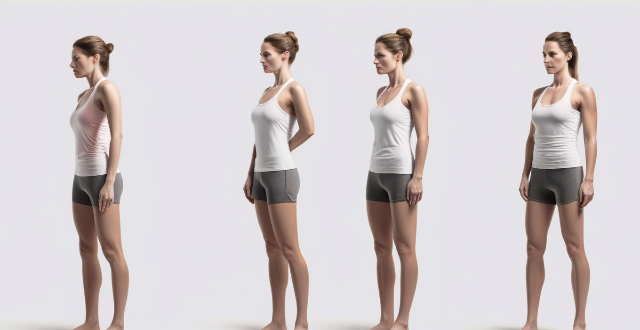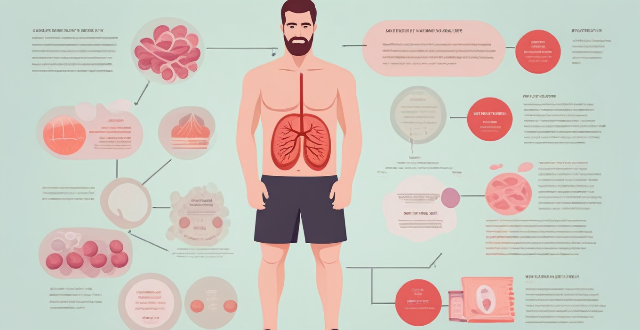Exercise Cardiovascular

Can exercise reduce the risk of developing cardiovascular diseases ?
Cardiovascular diseases (CVDs) are a leading cause of death worldwide, and regular physical activity or exercise is one of the most effective ways to reduce the risk of developing them. Exercise helps improve blood circulation, lower cholesterol levels, reduce inflammation, manage weight, and improve glucose control. The American Heart Association recommends at least 150 minutes per week of moderate-intensity aerobic activity or 75 minutes per week of vigorous-intensity aerobic activity, along with muscle-strengthening activities at least two days per week.

What role does cardiovascular exercise play in managing daily stressors ?
Cardiovascular exercise is an excellent way to manage daily stressors, as it reduces the body's physiological response to stress and leads to improved mental and physical health. The benefits of cardiovascular exercise include reduced stress levels, improved sleep quality, increased energy levels, and better mental health. To get started with cardiovascular exercise, set goals, start slow, find activities you enjoy, and mix up your workouts. Incorporating cardiovascular exercise into your daily routine can help you manage stress and improve overall well-being.

How much exercise do I need to maintain good cardiovascular health ?
Maintaining good cardiovascular health requires regular exercise, with the American Heart Association recommending at least 150 minutes of moderate-intensity aerobic activity or 75 minutes of vigorous-intensity aerobic activity each week, along with two or more days of muscle-strengthening activities. The amount of exercise needed may vary depending on individual needs and fitness level, and other lifestyle factors such as diet, stress management, sleep, and avoiding smoking and excessive alcohol consumption can also contribute to good cardiovascular health.

How does exercise improve cardiovascular health ?
This essay explores the ways in which exercise can improve cardiovascular health. It explains how regular physical activity strengthens the heart muscle, increases blood flow, and lowers blood pressure. The essay also discusses how exercise can reduce risk factors for cardiovascular disease, such as obesity, diabetes, and high cholesterol levels. Additionally, it highlights the positive effects of exercise on mental health and well-being, including stress reduction, depression management, and improved quality of life. Overall, the essay emphasizes the importance of regular exercise for a healthy lifestyle and encourages readers to incorporate physical activity into their daily routines.

Can aerobic exercise improve my cardiovascular health ?
Aerobic exercise is essential for maintaining and improving cardiovascular health, offering benefits such as strengthened heart muscle, lowered blood pressure, increased HDL cholesterol, reduced inflammation, weight management, improved circulation, and better blood sugar regulation. Regular aerobic activities like walking, jogging, cycling, swimming, or group fitness classes can significantly enhance overall heart health. The American Heart Association recommends at least 150 minutes of moderate-intensity aerobic exercise weekly, spread throughout the week, to achieve these benefits.

What is the difference between cardiovascular and resistance training in health management ?
The text discusses the differences between cardiovascular and resistance training, highlighting their unique benefits and examples of each. Cardiovascular training strengthens the heart, aids in weight management, and improves endurance, while resistance training enhances muscle strength, bone density, and metabolism. Combining both types of exercise leads to a well-rounded fitness regimen that addresses multiple aspects of health, including endurance, strength, flexibility, and balance. The text suggests ways to incorporate both forms of exercise into a workout routine for optimal health management.

Why is it a mistake to believe that more exercise automatically leads to better health ?
The belief that more exercise automatically leads to better health can be a mistake due to several reasons such as overexertion and injury risk, neglect of other aspects of health, cardiovascular strain, hormonal imbalances, and mental health impact. It is important to recognize that more is not always better and a balanced approach that incorporates appropriate amounts of exercise along with attention to nutrition, rest, and overall wellness is key to achieving optimal health outcomes.

Can climate change lead to an increase in cardiovascular diseases ?
The article discusses the relationship between climate change and cardiovascular diseases, highlighting how extreme heat events, changes in air quality, and extreme weather patterns can contribute to an increase in heart-related illnesses. It explains how dehydration and electrolyte imbalances caused by heat stress can strain the heart, leading to chest pain, shortness of breath, and even heart failure. The article also points out that rising temperatures can cause pollutants like ozone and particulate matter to become more concentrated in the air we breathe, irritating the lungs and reducing oxygen uptake, which can strain the heart. Additionally, extreme weather events like hurricanes, floods, and wildfires can have both direct and indirect effects on cardiovascular health by causing physical trauma, stress, lack of access to medical care, and disruptions in medication adherence and continuity of care for those with chronic cardiovascular diseases. The article concludes by emphasizing the importance of taking steps to protect cardiovascular health, such as staying hydrated during hot weather, monitoring air quality, and having emergency plans in place for natural disasters.

What are the favorite exercises of popular celebrities ?
Celebrities have different preferences when it comes to exercise, but they all share a common goal of staying fit and healthy. Some popular exercises among them include yoga, Pilates, cardiovascular exercises, and weight training. Yoga is favored by Jennifer Aniston, Gwyneth Paltrow, and Madonna for its benefits on flexibility, strength, and balance. Pilates is preferred by Kim Kardashian, Vanessa Hudgens, and Kate Hudson for strengthening the core muscles and improving posture. Cardiovascular exercises like running, cycling, and swimming are enjoyed by Taylor Swift, Emma Stone, and Ryan Reynolds for burning calories and improving cardiovascular health. Weight training is popular among Dwayne "The Rock" Johnson, Chris Hemsworth, and Gal Gadot for building muscle mass and increasing strength. Overall, celebrities incorporate these activities into their daily routines to maintain their impeccable physique and overall well-being.

What exercises are beneficial for women's health ?
Regular physical activity is crucial for women's health, preventing chronic diseases, improving mental health, and boosting self-esteem. Aerobic exercises like running, swimming, and cycling are great for cardiovascular health and weight management. Strength training exercises such as weightlifting, resistance bands, and bodyweight exercises can improve bone density and reduce the risk of osteoporosis. Yoga helps to improve flexibility, reduce stress, and enhance mental clarity, while Pilates focuses on core strength, flexibility, and balance. Incorporating these exercises into a fitness routine can lead to improved cardiovascular health, stronger bones and muscles, reduced stress levels, and enhanced overall well-being.

What are the best exercises for recovering from a sports injury ?
Recovering from a sports injury requires a combination of exercises that focus on flexibility, strength, cardiovascular fitness, stretching, and balance/coordination. Range of motion exercises help maintain joint flexibility, while strengthening exercises build muscle strength around the injured area. Cardiovascular exercises improve circulation and promote healing, while stretching exercises reduce stiffness and improve flexibility. Balance and coordination exercises improve stability and prevent future injuries. Incorporating these exercises into your rehabilitation program can speed up recovery and return to sport. It is important to consult with a physical therapist or healthcare professional before starting any new exercise program.

How does exercise contribute to bone health ?
Exercise contributes to bone health by increasing bone density, improving balance and coordination, strengthening muscles, improving posture, reducing inflammation, and enhancing cardiovascular health. This reduces the risk of osteoporosis, fractures, back pain, and other health issues.

How does age affect heart rate during exercise ?
Age affects heart rate during exercise by altering the structure and function of the aging heart, reducing maximum heart rate, shifting autonomic regulation towards sympathetic dominance, and decreasing cardiac reserve. Older individuals can still improve their cardiovascular fitness through regular exercise and lifestyle modifications.

How often should women exercise to see results ?
Exercising regularly is crucial for women's health, and the recommended frequency varies based on the type of exercise. Cardiovascular exercises are recommended at least 150 minutes per week, while strength training should be done at least twice a week. Flexibility and balance exercises should be included in the routine at least once a week. Various factors such as age, goals, fitness level, lifestyle, and health conditions can impact the effectiveness of the workout routine. It is essential to listen to your body and adjust your exercise routine accordingly to achieve optimal results and maintain a healthy lifestyle.

Can exercise reverse heart disease ?
Heart disease is a major cause of death worldwide, and it can be devastating to those affected. While there are many treatments available for heart disease, including medication and surgery, some people wonder if exercise can reverse the damage caused by heart disease. There is evidence that regular exercise can help prevent and manage heart disease by improving cardiovascular health, managing weight, lowering blood pressure, improving cholesterol levels, and reducing stress. However, there is no conclusive evidence that exercise can completely reverse heart disease. Despite this, there are still many benefits to regular exercise for heart health. If you have been diagnosed with heart disease or are at high risk for developing it, talk to your doctor about starting an exercise program. They can help you create an exercise plan that is safe and effective for your individual needs and goals.

Are there any risks associated with aerobic exercise ?
Aerobic exercise, also known as cardio, is a popular form of physical activity that involves increasing your heart rate and breathing hard for an extended period of time. While aerobic exercise has numerous health benefits, it is important to be aware of the potential risks associated with this type of exercise. In this article, we will discuss some of the risks associated with aerobic exercise and how to minimize them. Overexertion is one of the most common risks associated with aerobic exercise. To avoid overexertion, it is essential to start slowly and gradually increase the intensity and duration of your workouts. Another risk associated with aerobic exercise is the potential for injuries. To reduce the risk of injury, it is important to wear appropriate footwear and clothing, warm up before exercising, and use proper form and technique when performing exercises. Dehydration is another risk associated with aerobic exercise. To prevent dehydration, it is important to drink plenty of water before, during, and after your workouts. While rare, cardiovascular events such as heart attacks and strokes can occur during aerobic exercise. To minimize the risk of cardiovascular events, it is important to undergo a thorough medical evaluation before starting an aerobic exercise program.

Why is it important to warm up before exercise ?
Warming up before exercise is crucial for preparing the body, preventing injuries, and improving performance. Benefits include increased blood flow, raised body temperature, loosened joints, prepared nervous system, reduced cardiovascular risk, and enhanced workout results.

How does exercise influence aging and longevity ?
Exercise is crucial for maintaining good health and well-being, with numerous benefits including improved cardiovascular health and reduced risk of chronic diseases. It also has a significant impact on aging and longevity, as regular physical activity can help maintain muscle mass, improve bone density, and reduce the risk of chronic diseases. Exercise also has mental health benefits, such as improved cognitive function and reduced risk of depression and anxiety. Numerous studies have shown that exercise can lead to an increased lifespan by reducing the risk of premature death from various causes. Examples of long-lived populations, such as the Okinawans and Nicoyans, demonstrate the importance of an active lifestyle in promoting healthy aging and longevity. Incorporating exercise into your daily routine can lead to a higher quality of life during your golden years and potentially extend your lifespan.

How does regular exercise contribute to the prevention of chronic diseases ?
Regular exercise is essential for preventing chronic diseases by improving cardiovascular health, managing weight, and promoting mental health benefits. It strengthens the heart, lowers blood pressure, reduces cholesterol levels, burns calories, increases metabolism, improves insulin sensitivity, reduces stress and anxiety symptoms, improves sleep quality, and reduces depression symptoms. Incorporating regular exercise into your daily routine can provide long-term health benefits beyond physical fitness alone.

What are the benefits of monitoring heart rate during exercise ?
Monitoring your heart rate during exercise offers numerous benefits, including improved workout efficiency, better recovery, reduced risk of injury, increased motivation, and improved cardiovascular health. By keeping an eye on your heart rate, you can ensure you're getting the most out of every workout while also taking care of your body.

How does regular exercise contribute to boosting the immune system ?
Regular exercise has numerous health benefits, including boosting the immune system. It promotes increased blood circulation, reduces inflammation, helps in weight management, reduces stress, improves sleep quality, enhances gut health, increases antioxidant capacity, supports cardiovascular health, enhances mental health, and contributes to increased longevity. Incorporating regular physical activity into your lifestyle can support a strong and resilient immune system.

How does exercise influence self-esteem ?
Exercise has a profound impact on self-esteem, positively influencing confidence, body image, and mental health. Physical benefits include weight management through fat reduction and muscle tone, as well as improved cardiovascular health and immune system function. Mental benefits include stress reduction through endorphin release and mindfulness, and enhanced cognitive function with improved memory and problem-solving abilities. Social benefits come from community building through group activities and support systems, as well as personal achievement through goal setting and feedback. Overall, regular physical activity can significantly enhance self-esteem by promoting physical, mental, and social well-being.

Can exercise physiology be used to treat chronic diseases like diabetes and hypertension ?
Exercise physiology can be effectively used to treat chronic diseases like diabetes and hypertension by improving blood sugar control, aiding in weight management, reducing blood pressure, and enhancing cardiovascular health. Individualized exercise programs, education on lifestyle modifications, and consistent support from professionals contribute to better disease management and overall well-being.

How does regular exercise contribute to overall health management ?
This text discusses the importance of regular exercise for overall health management, highlighting its physical, mental, and emotional benefits. It emphasizes that exercise not only helps maintain physical health but also significantly contributes to mental and emotional well-being. The article lists various ways in which regular exercise contributes to overall health management, including improving cardiovascular fitness, aiding in weight management, enhancing muscle and bone health, boosting the immune system, preventing chronic diseases, reducing stress, improving mood, enhancing cognitive function, boosting self-esteem, providing opportunities for social interaction, and contributing to personal achievement. The text concludes by emphasizing that regular exercise is a crucial tool for managing overall health and that incorporating it into one's lifestyle is one of the best investments one can make for their health and well-being.

How often should I do aerobic exercise to see results ?
Aerobic exercise is an excellent way to improve your cardiovascular health, increase endurance, and burn calories. The frequency with which you should do aerobic exercise to see results depends on several factors, including your fitness level, goals, and overall health. If you are just starting out, it's recommended to do aerobic exercise three to four times a week for 20-30 minutes each session. As you become more comfortable with the activity, you can gradually increase the duration and frequency of your workouts. If your goal is to lose weight or improve your overall health, doing aerobic exercise three to five times a week for 30-60 minutes each session is recommended. If your goal is to increase endurance or compete in an athletic event, you may need to do aerobic exercise six or seven times a week for 45-90 minutes each session. It's important to listen to your body and avoid overtraining to prevent injury and burnout.

Are there any specific diets that enhance exercise efficiency ?
Yes, there are specific diets that can enhance exercise efficiency. These include a high-carbohydrate diet for energy, a low-fat diet for weight management and cardiovascular health, a high-protein diet for muscle recovery and maintenance, and a plant-based diet for optimal nutrient intake. Examples of foods in each diet category are provided, along with the benefits they offer for exercise efficiency. It is recommended to consult with a healthcare professional before starting any new diet plan.

Does exercise have different effects on cognitive function at different ages ?
This article explores the relationship between exercise and cognitive function across various age groups. It highlights the benefits of exercise for children's cognitive development, adults' reduced risk of cognitive decline, and older adults' slowed cognitive decline. Examples of suitable exercises for each age group are provided, including playing sports for children, aerobic activities for adults, and walking or cycling for older adults. The article concludes that incorporating physical activity into daily routines at any age is crucial for maintaining cognitive health and overall well-being.

What is the relationship between exercise physiology and nutrition for athletes ?
The article discusses how exercise physiology and nutrition are interconnected for athletes, with each influencing the other. It defines exercise physiology as the scientific study of how the body functions during physical activity, covering areas like energy systems, muscle function, cardiovascular responses, respiratory functions, and thermoregulation. Nutrition for athletes involves strategic eating plans to enhance performance, aid recovery, and maintain overall health, focusing on macronutrients, micronutrients, hydration, and timing of intake. The intersection of these two aspects includes fueling performance, recovery and repair, hydration and thermoregulation, energy balance, supplementation, and dietary needs variation. A comprehensive understanding of both exercise physiology and nutrition is crucial for athletes to achieve peak performance.

How does exercise physiology contribute to understanding the aging process and its effects on physical performance ?
Aging is a complex biological process that affects all living organisms, involving a gradual decline in physical and mental functions over time. Exercise physiology, the study of how the body responds to exercise, plays a crucial role in understanding the aging process and its effects on physical performance. As we age, our muscle mass and strength tend to decrease, cardiovascular fitness reduces, and joint pain and stiffness become more common. Exercise physiology helps us understand how the body adapts to regular physical activity at different stages of life, preventing age-related declines and promoting healthy aging through targeted exercise programs.